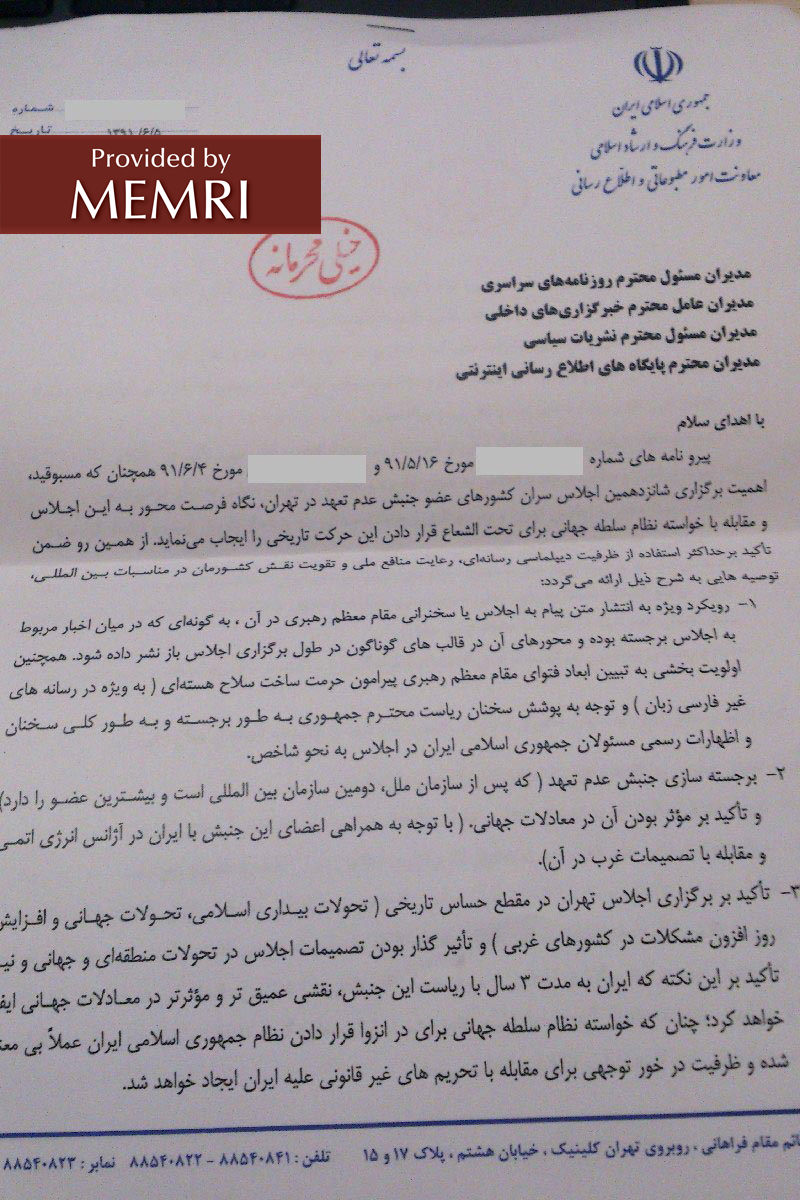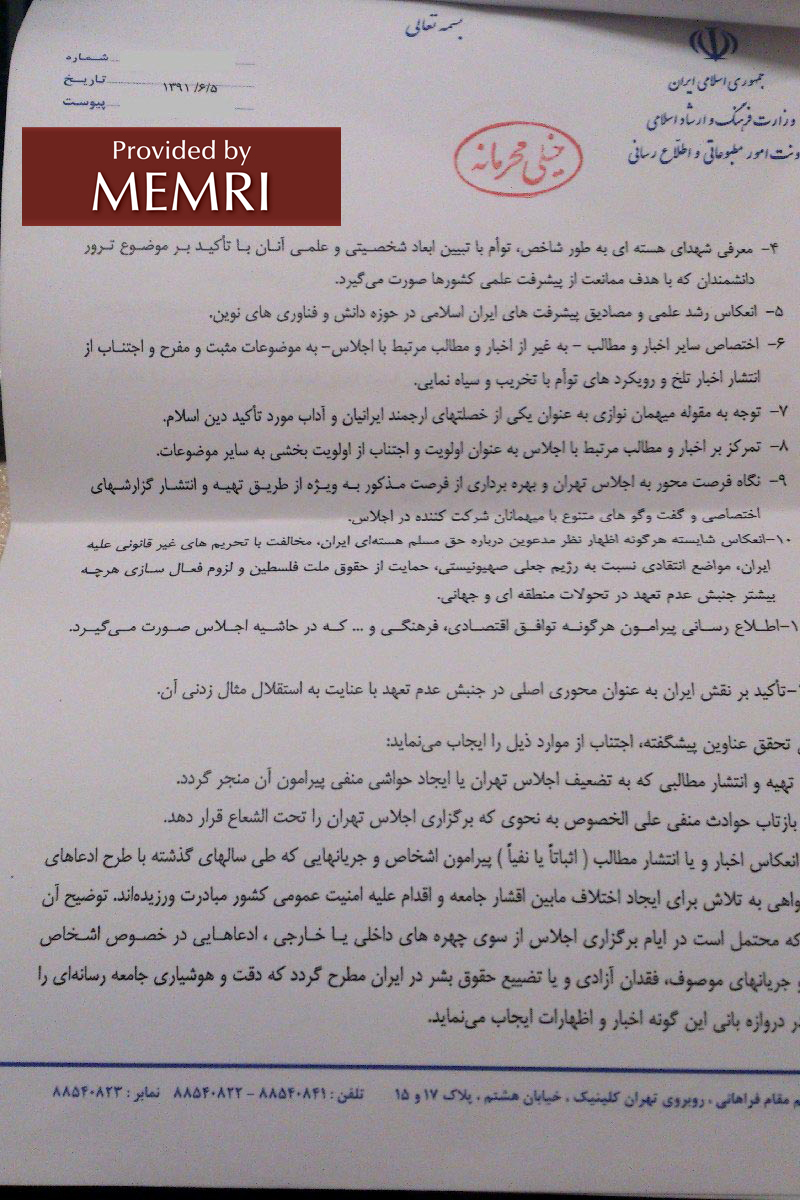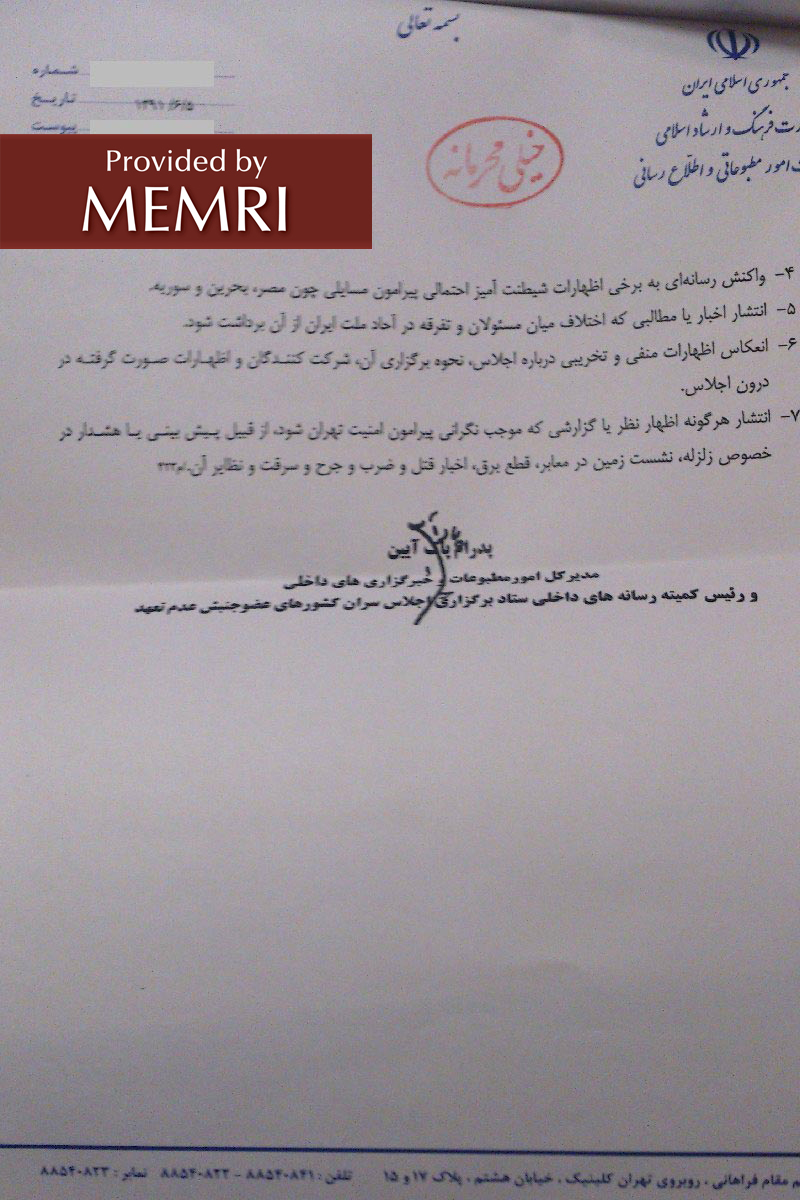 | ||||
| ||||
The distortion and censoring of statements by Egyptian President Muhammad Mursi and U.N. Secretary-General Ban Ki-moon at the Non-Aligned Movement conference in Tehran in late August 2012 to reflect the positions of the Iranian regime on Syria and Bahrain had repercussions worldwide, as well as in Iran.
In his speech at the conference, Egyptian President Mursi attacked the Syrian regime and expressed support for the Syrian people's struggle for freedom. However, each time he referred to "Syria," his interpreter from the official Islamic Republic of Iran Broadcasting (IRIB) organization substituted "Bahrain."[1] In addition, Arab terms were replaced by Shi'ite-Islamic terms – for example, his reference to "the Arab Spring" was translated as "the Islamic Awakening," and his mention of the Sunni caliphs was translated as the Shi'ite Ahl Al-Bayt – and so on.
Furthermore, U.N. Secretary-General Ban Ki-Moon's call at a press conference for the release of Iranian political prisoners, and first and foremost the leaders of the protest movement, was censored by the Iranian media – as was his request that the Iranian regime leaders improve their cooperation with the U.N. in the nuclear issue.[2]
While IRIB's director called the censoring and mistranslation an "unintentional mistake," several Iranian websites criticized the deliberately slanted coverage, stating that it had boomeranged on Iran and done damage to it.
It should be emphasized that although regime circles referred to the incidents as an "unintentional mistake," on August 27, 2012, just as the conference got underway, the reformist website Kaleme, identified with supporters of protest movement leader Mir Hossein Moussavi, who remains under house arrest, posted a document leaked from the Iranian Ministry of Culture and Islamic Guidance and signed by the head of the internal media committee of the headquarters of the NAM conference, with explicit guidelines for all Iranian media on how they were to cover the events of the conference according to the regime's demands. The document included an explicit regime demand not to publish damaging statements regarding Egypt, Bahrain, or Syria, and also for media to be extremely cautious in any mention of speakers' references to Iranian human rights violations and lack of freedoms.
The following is a summary of the leaked document, followed by the main reactions in Iran to the censorship of Mursi's and Ban Ki-moon's statements:
Kaleme Posts Leaked Official Iranian Regime Guidelines For Media On How To Cover NAM Conference
On August 27, 2012, as the NAM conference in Tehran began, the Kaleme website, which is identified with supporters of Mir Hossein Moussavi, posted the guidelines issued by Iran's Culture and Islamic Guidance Ministry for news and media coverage of the conference. The document (see Appendix) is signed by regime officials and stamped "Top Secret."
The following are the main guidelines in the document:[3]
The document is signed by the director-general of the press department of the Culture and Islamic Guidance Ministry and by the secretary of the internal media committee of the NAM conference headquarters in Tehran.
Reactions In Iran To The Censorship At The NAM Conference
In response to the criticism in the Arab world on the distortion of Mursi's speech, IRIB director Ezzatollah Zarghami stated that the interpreter had erred unintentionally due to fatigue.[5]
Iranian websites and daily newspapers criticized the distortion of Mursi's statements, and claimed that it had damaged the prestige of the conference as well as Iran's status.[6]
A September 2, 2012 article on Alef, a website identified with Majlis member Ahmad Tavvakoli, called the distortion of part of Mursi's statements by the Iranian interpreter "inconceivable," but added that it involved "no advance planning whatsoever" and was "based on a personal decision by the interpreter out of his perception of the interest of the regime." The website added that Mursi's and Ban Ki-moon's statements should not have been censored, and that a broadcast of their critical statements should have been allowed. The website discussed the censorship incidents in a way that implied criticism of the regime, saying: "The incident happened not because of premeditation but because of the way that the institutions that are responsible [for oversight] of the media [in Iran] have treated the media in recent months, causing the media to censor itself [and thus to omit the statements of Ban Ki-Moon regarding the political prisoners and leaders of the protest movement]. [This self-censorship comes] naturally, but is not desirable."[7]
Nevertheless, the Vatan-i Emrouz daily, which is identified with the Ahmadinejad government, defended the distortion of parts of Mursi's speech, claiming that IRIB had "censored [only] 5% of Mursi's speech... Yesterday, we disagreed 100% with [anything former Egyptian president] Hosni Mubarak [said]; today, we have a problem with only a few sentences by Egypt's new president. Who is Muhammad Mursi, anyway? Even if [Syrian President] Bashar Al-Assad [himself] gave an hour-long speech in Tehran, we would omit a few of his sentences."[8]
Appendix: Photocopy Of The Leaked Press Coverage Guidelines Posted By Kaleme  
[1] Likewise, when Mursi expressed his revulsion at Russia's and China's UN Security Council veto against Syria, his Iranian interpreter substituted "Bahrain" for "Syria." Tabnak, Iran, September 2, 2012. Seehttp://www.lenziran.com/2012/09/undeniable-proof-of-aljazeera-tv-of-changing-the-word-syria-with-bahrain-in-morsi-speech-by-translator/ .
[3] Kaleme (Iran), August 27, 2012. Kaleme stated that the document was leaked on the blog of an Iranian exile (vahid-online.net), a few hours prior to its publication by Kaleme.
[4] MEMRI Inquiry and Analysis Series No. 825, Renewed Iran-West Nuclear Talks – Part II: Tehran Attempts to Deceive U.S. President Obama, Sec'y of State Clinton With Nonexistent Anti-Nuclear Weapons Fatwa By Supreme Leader Khamenei, April 19, 2012.
[5] Mehr (Iran), September 2, 2012; Jomhouri-e Eslami (Iran), September 3, 2012.
[6] See for example Ebtekar, Entekhab.ir, Baztab.net, September 3, 2012; Asr-e Iran, Tabnak (Iran), September 2, 2012.
[7] Alef.ir, September 2, 2012.
[8] Vatan-i Emrouz (Iran), September 2, 2012.
| |






















